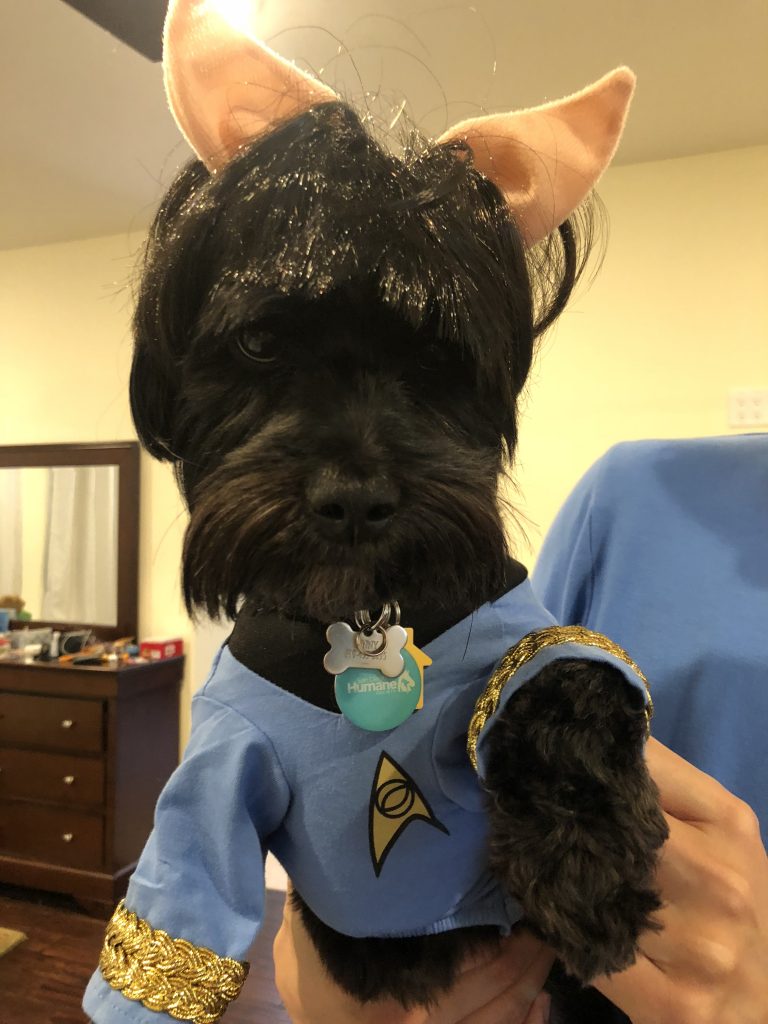Models for Physician Leadership: Why can’t it be a Starship Captain?

May 26, 2020
by drplasticpicker
It has been three years since I transitioned to physician middle management. This weekend was our three year anniversary of our six year term. I texted our group congratulations and reminded them that three years is a long time to do anything. Each of us have earned almost a bachelors degree worth of physician leadership, and another three years to go. Six years would be equivalent to a doctorate. At the three year mark in the midst of the COVID-19 pandemic, I can honestly say I would never have traded this leadership experience for anything. It has been a challenging three years, and we’ve had adventure after adventure – but it’s forced me to grow professionally and personally. Sometimes painfully but always worthwhile. I have accomplished and been part of projects I never thought possible, and have been pushed out of my comfort zone and forced to grow as a sentient emphathic person.
Now that I am settled into this role, we are restructuring the leadership development in our department. We are making leadership more transparent. I am going to start working on that project tomorrow morning, but blogging about it here does help me sort out my thoughts. I need to write out the avenues of leadership that currently exist, the current committees in the department, everyone who sits on those committees and their terms thus far, and the actual responsibilities they hold. The goal is that pediatricians are underrepresented in our organization’s physician upper management. We have to strengthen the skill set of our entire department, and build a larger and deeper leadership pool. By building these new leaders, pediatricians will then gain a greater voice in our organization. And honestly leadership needs to turn over to make way for younger physicians. If someone has been sitting in a position for over a decade, they have to move on.
Since the beginning of this journey, I’ve found it odd that I have had mutliple people in different parts of my life start giving me leadership books. Many many leadership books. I just snapped a picture of them from my work shelf.

“Leading Quietly” was written by someone I actually know from back in our Harvard days. Joe Badaracco was the last House Master/Dean at Currier House where Mr. Plastic Picker and I were premedical advisors. I perused “Dare to Lead” by Brene Brown and I’ve seen her quoted many times on line and many memes made of her writings. I’ve flipped through all the other books as well. Sometimes when Mr. Plastic Picker and I are frustrated in our mutual roles as middle-managers (he is a middle-manager too), we will sometimes look for the answer in one of the books. But I will confess here on this blog. I am a voracious reader. I love reading. I’ve read every Austen, Bronte, Dickens, half of Shakespeare, George Elliot, EM Forester, Hugo and on and on. As to these leadership books, I’ve flipped through each of these books and I found them for the most part boring. There were good sections here and there, but have not finished any of those books. I read for fun. I find being a pediatrician, picking up plastic and even being a middle-manager fun. Those books are not fun. I find no joy in them.
But I do find joy in Star Trek! As you know, I have been watching a lot of Star Trek and wrote one of my all time favorite blogposts on it recently regarding Trip and T’Pol’s romance on Star Trek Enterprise https://drplasticpicker.com/the-star-trek-enterprise-romance-of-tpol-and-trip-im-going-to-give-them-the-ending-they-deserve/. I want to ask a profound question here. Why can’t Star Trek and their Starship Captains be a model for physician leadership? Through watching Star Trek these last three months, I have been more inspired in my role as leader than any of the above books or listening to another overpriced former sports figure speak.
Five Leadership Lessons I have Learned from Star Trek Enterprise
- It is Important to Socialize with the Crew (Oh I mean Department): I am rewatching Star Trek Enterprise and am on season 2 again, Episode 12 “Cat Walk.” the Enterprise is in the middle of a neutron storm, and the crew is living in the large crawl space in the nacelle section of the ship. Trip, the chief engineer, converted a small room into the makeshift bridge. T’Pol, the female Vulcan science officer and first officier, and Captain Johnathan Archer have to command the ship and sleep there. All 86 crew members are living in close camp-like quarters. Captain Archer advised T’Pol to walk amongst the crew tomorrow, and that fraternizing with the crew is part of a skill she needs to build. T’Pol as a Vulcan does not seek out that personal connection. I had described in a previous post that despite my sometimes gregarious seeming nature on the outside, I am truly an introvert https://drplasticpicker.com/star-trek-harry-potter-and-living-in-space-and-fantasy-will-help-us-raise-our-children/. When Captain Archer told that to T’Pol that she needs to learn to interact with the crew, I felt he was speaking to me.

2. It is Important Not To be Focused On Seemingly Trivial Tasks: In Season 2, Epsiode 9 “Singularity” the crew is being exposed to excessive amounts of radiation. Slowly each human member becomes fixated on trivial tasks. Trip, the Chief Engineer, on fixing and modifying the Captain’s chair. Captain Archer on writing a preface for a biography on his father. Lietenant Reed on the Tactical Alert, new security protocols for the ship. Only T’Pol, the science officer, with her Vulcan physiology is immune to this. Only Lieutenant Reed’s Tactical Alert ended up being important for the crew, and even that just a portion of his plan. The single-minded fixation that each crew member had on one tasks was almost to the detriment to the entire ship. I cannot express how much that episode spoke to me. We have physician schedules with alotted time slots for certain kinds of visits. Telephone, video, well baby, 30 minute consult slot. In my entire career in our organization, I can tell you I have never paid attention to any of this. I am on one end of the spectrum and see whatever patient hits my schedule, and even if they are an hour late – it usually all works out. On the other end are a small but very annoying section of our department that only looks at their schedule. Sometimes I think they need to work harder and why in the world do they have enough time to count the number of patients they see? We are not paid on productivity which is part of the problem. Anyway, this fixation that a child with a migraine should be put in this time slot versus that time slot. This is one of my weaknesses because I have very little patience for those that complain about these “scheduling errors.” A patient is never an error. But next time someone complains to me about this, I will look at them and realize that they are being bombarded with radiation and they are being afflicted with single minded obsession over trivial matters. Just like T’Pol could not reason with her crewmates, she had to push Captain Archer into the shower and wake him up. She had to get some help and steer the Enterprise out of the radiation. Physician burnout and a poorly run organization can be like radiation. Wow that was really profound.
3. Every Threat Has to Be Solved by the Crew Together, With All It’s Sections: On each episode the crew always meets a grave threat. The human terrorist of Terra Prime, the Xindi trying to destroy Earth, or even the silicon-based virus that almost wiped out the crew were some of the more memorable one. And in each episode there was a grave threat that required leadership and teamwork to overcome it. It’s hard to know which crew member or section will play the crucial role to help overcome the threat. It could be Lieutenant Reed the Armory Officer. It could be Trip, the Chief Engineer. It could be Dr. Phlox from Sick Bay. Often it is T’Pol, the female Vulcan Science Officer. It is the commanding officers job to gather the resources at hand, and solve the problem – neutralize the threat or make that new discovery.
4. You Will be Injured Along the Way, But You Don’t Get to Explore Space and Yourself Without Bearing Those Personal and Physical Scars: I have been lucky in life and I am grateful. I live a relatively sheletered life, and my big adventure was going off to college on the East Coast. But professionally being in middle-management, I feel I have been pushed professionally to confront tasks that are unfamiliar. Human resources, million dollar budgets, interacting with labor unions and negotiations. When I had a pediatrician suddenly quit in the middle of Thanksgiving and Christmas, and had to scramble to find holiday coverage. When there was a measles exposure at our own clinic, and had to help manage our office’s response and deal with media coverage, scheduling exposed babies to get the immunoglobulin in time, and coordinating the response of our department and staff. Each of those events was like a discrete episode of an adventure show. When I think of all the monumental tasks facing us now in medicine during this COVID-19 pandemic, I often think of Star Trek. If Captain Johnathan Archer was able to defeat the Xindi and the different factions from the Temporal Cold War. If T’Pol was able to live with Panar syndrome that she contracted when someone forcibly mind-melded with her. If Dr. Phlox was able to cure the Klingon colonist from the virus brought on my the augments (genetically augmented humans that were left over from the genetic wars), than certainly I can acccomplish the particular task I have on hand.
5. Model of Leaderhip Are Everywhere On A Starship: One of the things I have struggled with during my leadership journey is who to look up to. I have a tendency to idealize people and place them on a pedestal. And when they tumble down that pedestal by simply being human, I am hurt. That adulation is not healthy for anyone, neither the person that is idolizing someone or the person being idolized. The change in our department leadership was a politically fraught transition, as most things are. The particulars are not important. But when our former chief stepped down, I cried. To me he was the person who hired me, the person I looked up to, and in the end was always the one that had the greatest integrity. Now being in my role for three years with our new leadership, I realize that he was far from perfect. No one is perfect. The longer I am in this position I realize, he was a pretty fantastic leader. But I felt the years of responsibility weighed on him. I worry about continuing in leadership and the toll that it will play on my life and my children and marriage. But the power of looking to Star Trek Starship Captains and characters as role models, is that the ease the burden from our real life role models as well. Imagination and dreaming are important skills and coping mechanisms we humans use.
So these are my ramblings thoughts at night about Star Trek and leadership. The next time I’m at one of our leadership meeting sitting next to our department leader, acting as the first commander – I will remember. I will remember that sometimes when various people ramble about scheduling errors or nitpicking about some workflow, that like in the episode “Singularity” that you cannot reason with them. We have to steer the department ship out of the neutron storm. Their neocortex is being bombarded with radiation. I think my brain is more like a Vulcan, and immune.

1 thought on “Models for Physician Leadership: Why can’t it be a Starship Captain?”
-
Pingback: 5-27-2020 Five Reasons to Be Hopeful This Wednesday: REAL ESTATE! – Dr. Plastic Picker
